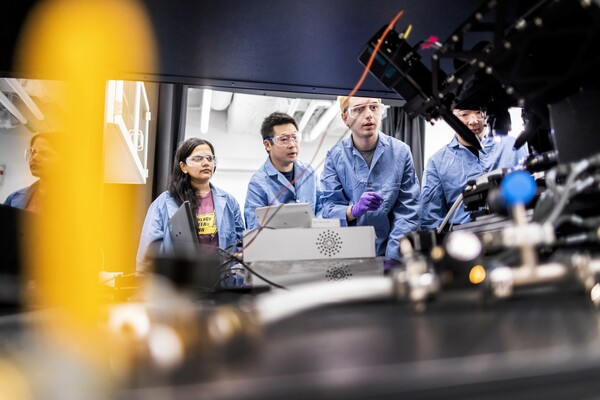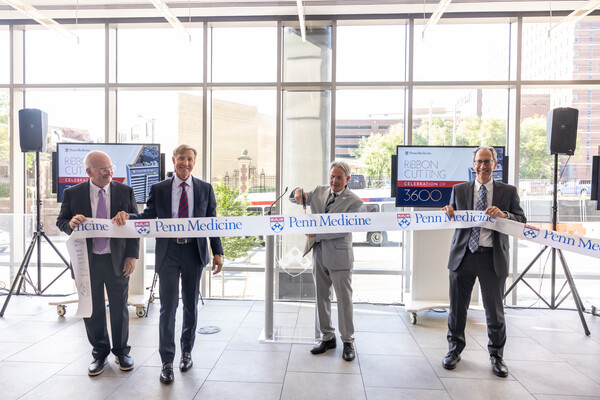
Image: Kindamorphic via Getty Images
A loud, heated argument between two high school boys in the school hallway ended in the principal’s office. The students were about to fight because one boy was fearful that the other would “out him” as gay. The principal would eventually invite the school nurse and the guidance counselor to the meeting, but would parents or guardians be privy to the office discussion?
This scenario is part of a Penn Futures Project (PFP) videotaped role play simulation involving Penn students in the professional roles for which they are training and paid actors portraying high school students. It is part of the PFP project “Mental and Medical Health Support for LGBTQ Teens.”
The simulation is one of five innovative pilot programs of the Penn Futures Project, a joint initiative between three of Penn’s professional schools: the Graduate School of Education (GSE), the School of Nursing, and the School of Social Policy & Practice (SP2). Launched in 2015, the PFP aims to collaboratively address pressing social issues that affect Philadelphia’s most vulnerable young people and their families.
On Monday, Feb. 12, deans from the three schools met in Fagin Hall with research teams for an update on the five PFP projects. They also announced two Penn professors, Vivian Gadsden and Terri Lipman, are taking over the PFP leadership reins from the three deans.
“We all know deans can only take things so far,” said GSE Dean Pam Grossman. “It takes the faculty stepping in and providing some of that intellectual leadership to take it to the next level.”
Gadsden, the William T. Carter Professor of Child Development and Education at GSE, directs the National Center on Fathers and Families. Lipman is the Miriam Stirl Endowed Term Professor of Nutrition, a professor of nursing of children, and assistant dean for community engagement at Penn Nursing.
Gadsden and Lipman will oversee a portfolio of projects that also include “Preparing Leaders in Child Welfare and Child Advocacy;” “Penn Graduate School Alliance for Field Practice at the Kensington Sciences Academy;” “Using Philadelphia’s Integrated Data System to Measure, Monitor and Foster Child, Family and Community School Readiness;” and “Serving LGBTQ Youth & Families: Preparing the Next Generation of Social Workers, Teachers, School Counselors & Nurses.”
The annual progress reports presented by project leaders show that the Penn Futures investment in the lives of marginalized children and their families is having a positive impact. For instance, the Kensington Sciences Academy program reports that the percent of days that the school reached 95 percent attendance has increased from 10 percent to 54 percent this school year, approaching the Philadelphia School District average of 57 percent.
The PFP pilot using Philadelphia’s integrated data system is successfully building on an existing Penn partnership with the city to integrate administrative data from government agencies to identify and address key issues facing youth and families. The project looks across city systems and agencies to identify young children who are high-cost service recipients and creates a model that can be used to improve service delivery and inform intervention building.
The deans also received updates from the Calvin Bland Fellows, faculty members from each school, who as part of the Penn Futures Program are promoting multi-pronged cross-disciplinary approaches to address issues specifically facing at-risk young men of color.
Penn Nursing Dean Antonia Villarruel welcomed attendees at the Feb. 12 event and expressed excitement about their achievements.
“You all have been great pioneers and have had some struggles and successes,” she said. “We know that this work isn’t easy—but we are so proud of what you have accomplished.”
Traditionally, students training as educators, nurses, and social workers have separate educational paths. The PFP hopes to change this so that graduates will know how to maximize their interactions in the field to better serve children and families.
“What [the Penn Futures Project] is modeling is something we think other universities around the country can and should do,” said SP2 Dean John L. Jackson Jr. “It is transformational.”

Image: Kindamorphic via Getty Images

nocred

nocred

(From left) Kevin B. Mahoney, chief executive officer of the University of Pennsylvania Health System; Penn President J. Larry Jameson; Jonathan A. Epstein, dean of the Perelman School of Medicine (PSOM); and E. Michael Ostap, senior vice dean and chief scientific officer at PSOM, at the ribbon cutting at 3600 Civic Center Boulevard.
nocred